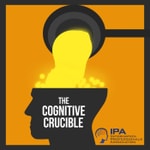The Cognitive Crucible – Details, episodes & analysis
Podcast details
Technical and general information from the podcast's RSS feed.

The Cognitive Crucible
Information Professionals Association
Frequency: 1 episode/8d. Total Eps: 228

Recent rankings
Latest chart positions across Apple Podcasts and Spotify rankings.
Apple Podcasts
🇩🇪 Germany - government
19/06/2025#83🇩🇪 Germany - government
18/06/2025#63🇩🇪 Germany - government
17/06/2025#40🇩🇪 Germany - government
08/06/2025#81🇩🇪 Germany - government
02/06/2025#79🇺🇸 USA - government
02/06/2025#97🇩🇪 Germany - government
01/06/2025#51🇩🇪 Germany - government
31/05/2025#33🇩🇪 Germany - government
30/05/2025#96🇩🇪 Germany - government
29/05/2025#72
Spotify
No recent rankings available
Shared links between episodes and podcasts
Links found in episode descriptions and other podcasts that share them.
See allRSS feed quality and score
Technical evaluation of the podcast's RSS feed quality and structure.
See allScore global : 63%
Publication history
Monthly episode publishing history over the past years.
#199 Ellen McCarthy on Trust in Media and Information
mardi 10 septembre 2024 • Duration 49:27
The Cognitive Crucible is a forum that presents different perspectives and emerging thought leadership related to the information environment. The opinions expressed by guests are their own, and do not necessarily reflect the views of or endorsement by the Information Professionals Association.
During this episode, Ellen McCarthy discusses how to conceptualize and develop standards and measurements on information quality, how to align AI with accurate and reliable information, and how challenges and potential of leveraging AI can support information quality. Also, be sure to check out and register for the upcoming 28 October symposium co-sponsored by TIM and IPA: Beyond the Noise - Elevating Information Quality in a Generative AI Era.
Recording Date: 5 Sept 2024
Research Question: Ellen McCarthy suggests an interested student examine macroeconomic indicators or drivers of information consumption.
Resources:
- Cognitive Crucible Podcast Episodes Mentioned
- Ellen McCarthy Bio
- October 28, 2024 Symposium
- Gallup: U.S. Confidence in Institutions Mostly Flat, but Police Up
- Gallup: Confidence in Institutions
- DOJ: Two RT Employees Indicted for Covertly Funding and Directing U.S. Company that Published Thousands of Videos in Furtherance of Russian Interests
- Information Sharing and Analysis Centers
- Alfred North Whitehead quote: “Civilization advances by extending the number of important operations which we can perform without thinking of them.”
Link to full show notes and resources
Guest Bio: The Honorable Ellen McCarthy is a national security professional with extensive experience in government and the private sector. She has held several high-level positions in the U.S. intelligence community and has worked on a wide range of national security issues. Ellen served as the Assistant Secretary of State for Intelligence and Research from 2018 to 2020. In this role, she oversaw the State Department's intelligence analysis and provided support to senior policymakers on foreign policy matters. Before that, she was the President of Noblis NSP, a national security-focused science and technology company. She also served as the President of the Intelligence and National Security Alliance (INSA), a non-profit organization focused on addressing intelligence and national security priorities. Prior to her time in the private sector, McCarthy held various leadership positions in the intelligence community, including serving as the Chief Operating Officer of the National Geospatial-Intelligence Agency and the Director of Intelligence Operations at the U.S. Coast Guard. She was also lead for Human Capital and Security for the Under Secretary of Defense for Intelligence and started her career as an all source intelligence analyst within the Office of Naval Intelligence and the Atlantic Intelligence Command. She is a wife, mother, daughter and friend.
About: The Information Professionals Association (IPA) is a non-profit organization dedicated to exploring the role of information activities, such as influence and cognitive security, within the national security sector and helping to bridge the divide between operations and research. Its goal is to increase interdisciplinary collaboration between scholars and practitioners and policymakers with an interest in this domain.
For more information, please contact us at communications@information-professionals.org.
Or, connect directly with The Cognitive Crucible podcast host, John Bicknell, on LinkedIn.
Disclosure: As an Amazon Associate, 1) IPA earns from qualifying purchases, 2) IPA gets commissions for purchases made through links in this post.
#198 Melissa Graves Frank Emerson and Pat Hendrix on OSINT
mardi 27 août 2024 • Duration 40:39
The Cognitive Crucible is a forum that presents different perspectives and emerging thought leadership related to the information environment. The opinions expressed by guests are their own, and do not necessarily reflect the views of or endorsement by the Information Professionals Association.
During this episode, Melissa Graves, Frank Emerson, and Pat Hendrix discuss the history of Open Source Intelligence (OSINT), how publicly available information (PAI) is being analyzed by students in the Department of Intelligence and Security Studies at The Citadel, and The Citadel’s Open Source Intelligence Conference which will be held October 23-25, 2024.
Recording Date: 26 Aug 2024
Research Questions:
- Where does academia fit within the OSINT landscape?
- What should students be allowed to collect?
- How can students be best kept safe during OSINT analysis?
Resources:
- Citadel’s Open Source Intelligence Conference October 23-25, 2024
- Cognitive Crucible Podcast Episodes Mentioned
- Melissa Graves bio
- Frank Emerson bio
- Pat Hendrix bio
- We Are Bellingcat: Global Crime, Online Sleuths, and the Bold Future of News by Eliot Higgins
- Alexei Navalny Russia Documentary (HBO)
Link to full show notes and resources
Guest Bio:
Melissa Graves is an Associate Professor in the Department of Intelligence and Security Studies at The Citadel and currently serves as the head of the department. Her research areas include national security legal issues, the US presidency’s relationship to the intelligence community, and intelligence analysis. She teaches a variety of courses on intelligence and legal issues. Her book, Nixon’s FBI: Hoover, Watergate, and a Bureau in Crisis, evaluates the historically complex and oftentimes fraught relationships between the President, Attorney General, and FBI Director.
Frank Emerson is a senior policy consultant and accomplished leader with almost three decades of experience in U.S. national security, intelligence, and foreign policy matters. He served overseas with the U.S. Central Intelligence Agency and Department of State, driving worldwide operations, conducting diplomacy, and building diverse multi-agency international programs.
Dr. Michael Pat Hendrix is an Assistant Professor in the Department of Intelligence Analysis and Security Studies at The Citadel Military College. His research areas include intelligence analysis and communication and African national security issues. He teaches a variety of undergraduate and graduate courses including analysis and research, open source intelligence, homeland security, and the department capstone.
About: The Information Professionals Association (IPA) is a non-profit organization dedicated to exploring the role of information activities, such as influence and cognitive security, within the national security sector and helping to bridge the divide between operations and research. Its goal is to increase interdisciplinary collaboration between scholars and practitioners and policymakers with an interest in this domain.
For more information, please contact us at communications@information-professionals.org.
Or, connect directly with The Cognitive Crucible podcast host, John Bicknell, on LinkedIn.
Disclosure: As an Amazon Associate, 1) IPA earns from qualifying purchases, 2) IPA gets commissions for purchases made through links in this post.
#189 Todd Wilcox on PAI, OSINT, and Regulations
mardi 7 mai 2024 • Duration 01:02:09
The Cognitive Crucible is a forum that presents different perspectives and emerging thought leadership related to the information environment. The opinions expressed by guests are their own, and do not necessarily reflect the views of or endorsement by the Information Professionals Association.
During this episode, Todd Wilcox discusses national security considerations related to publicly available information (PAI), open source intelligence (OSINT), and related regulations.
Research Question: Todd Wilcox suggests a valuable topic for academic research would be the application of regulatory framework around the collection, storage, manipulation and application of personally identifiable information (PII). With the comprehensive discretion of current regulatory requirements imposed by CCPA in US and GDPR in the EU, compare and contrast these two regulations and provide a proposed standard that could be used to build federal legislation to protect the privacy of digital device users in the US.
Recording Date: 16 April 2024
Resources:
- Cognitive Crucible Podcast Episodes Mentioned
- Patriot Defense Group
- A History of Protecting Freedom Where Law and Technology Collide
- Traction: Get a Grip on Your Business by Gino Wickman
Link to full show notes and resources
Guest Bio: Todd Wilcox is the Founder and Chief Executive Officer of Patriot Defense. He founded Patriot Defense in 2005 with the purpose of Serving those who defend America. Todd is a decorated combat veteran, former CIA case officer, and a successful entrepreneur and business leader.
About: The Information Professionals Association (IPA) is a non-profit organization dedicated to exploring the role of information activities, such as influence and cognitive security, within the national security sector and helping to bridge the divide between operations and research. Its goal is to increase interdisciplinary collaboration between scholars and practitioners and policymakers with an interest in this domain.
For more information, please contact us at communications@information-professionals.org.
Or, connect directly with The Cognitive Crucible podcast host, John Bicknell, on LinkedIn.
Disclosure: As an Amazon Associate, 1) IPA earns from qualifying purchases, 2) IPA gets commissions for purchases made through links in this post.
#100 Rand Waltzman on the Metaverse and Immersive Virtual Reality
mardi 14 juin 2022 • Duration 49:25
The Cognitive Crucible is a forum that presents different perspectives and emerging thought leadership related to the information environment. The opinions expressed by guests are their own, and do not necessarily reflect the views of or endorsement by the Information Professionals Association.
During this episode, IPA founding board member, Dr. Rand Waltzman, returns to the Cognitive Crucible to discuss the Metaverse and his popular Disinformation 101 series. Our wide ranging discussion covers cognitive challenges related to immersive virtual reality environments, sensor technology, emerging influence methods, cognitive behavioral therapy, affective computing, and kayfabe.
Resources:
- Cognitive Crucible Podcast Episodes Mentioned
- #83 Joseph Lee on Jung and Archetypes
- #47 Yaneer Bar-Yam on Complex Systems and the War on Ideals
- #90 Dave Acosta on Informationally Disadvantaged
- #64 Greg Radabaugh on Informational Power
- #82 John DeRosa and Alex Del Castillo on Measuring Effectiveness of Operations in the Information Environment
- #81 Cassandra Brooker on the Effectiveness of Influence Activities
- #69 Matt Venhaus on ARLIS & the Cognitive Security Proving Ground
- #38 Lori Reynolds on Operations in the Information Environment
- #75 Todd Manyx on the MCIOC
- #1 Rand Waltzman on Cognitive Security
- Rand Waltzmans' Disinformation 101 Series
- GPT-3
- New Age Bullshit Generator
- The Humbugs of the World: An Account of Humbugs, Delusions, Impositions, Quackeries, Deceits and Deceivers Generally, in All Ages by Phineas Taylor Barnum
- Kayfabe
- WHAT SCIENTIFIC CONCEPT WOULD IMPROVE EVERYBODY'S COGNITIVE TOOLKIT: Kayfabe by Eric R. Weinstein
- Affective Computing
Link to full show notes and resources
https://information-professionals.org/episode/cognitive-crucible-episode-100
Guest Bio:
Dr. Waltzman has 35 years of experience performing and managing research in Artificial Intelligence applied to domains including social media and cognitive security in the information environment. He is formerly Deputy Chief Technology Officer and a Senior Information Scientist at the RAND Corporation in Santa Monica, CA. Prior to joining RAND, he was the acting Chief Technology Officer of the Software Engineering Institute (Washington, DC) of Carnegie Mellon University. Before that he did a five-year tour as a Program Manager in the Information Innovation Office of the Defense Advanced Research Projects Agency (DARPA) where he created and managed the Social Media in Strategic Communications (SMISC) program and the Anomaly Detection at Multiple Scales (ADAMS) insider threat detection program. Dr. Waltzman joined DARPA from Lockheed Martin Advanced Technology Laboratories (LM-ATL), where he served as Chief Scientist for the Applied Sciences Laboratory that specializes in advanced software techniques and the computational physics of materials. Prior to LM-ATL he was an Associate Professor in the Department of Computer Science at the Royal Institute of Technology in Stockholm, Sweden, where he taught and performed research in applications of Artificial Intelligence technology to a variety of problem areas including digital entertainment, automated reasoning and decision support and cyber threat detection. He has also held research positions at the University of Maryland, Teknowledge Corporation (the first commercial Artificial Intelligence company in the world where he started in 1983), and the Applied Physics Laboratory of the University of Washington. Dr. Waltzman serves as Advisory Board Member of GLOBSEC HADES initiative. He is also a founding board member of the Information Professionals Association.
About: The Information Professionals Association (IPA) is a non-profit organization dedicated to exploring the role of information activities, such as influence and cognitive security, within the national security sector and helping to bridge the divide between operations and research. Its goal is to increase interdisciplinary collaboration between scholars and practitioners and policymakers with an interest in this domain.
For more information, please contact us at communications@information-professionals.org.
Or, connect directly with The Cognitive Crucible podcast host, John Bicknell, on LinkedIn.
Disclosure: As an Amazon Associate, 1) IPA earns from qualifying purchases, 2) IPA gets commissions for purchases made through links in this post.
Bonus Episode: Gladiator School
vendredi 10 juin 2022 • Duration 06:55
The Cognitive Crucible is a forum that presents different perspectives and emerging thought leadership related to the information environment. The opinions expressed by guests are their own, and do not necessarily reflect the views of or endorsement by the Information Professionals Association.
During this bonus episode, Col. Brian Russell discusses Gladiator School, which is the official podcast of II MEF Information Group. Gladiator School places you and the experts into the arena. Whether you’re a Marine, member of the DoD or a civilian, Gladiator School has something for you.
Resources:
- Here's where you can listen to or watch Gladiator School
- Also mentioned:
Guest Bio:
Colonel Brian Russell is the commanding officer of II Marine Expeditionary Force Information Group (II MIG) in Camp Lejeune, North Carolina. He commissioned as a Marine Corps Officer in December 1995 from North Carolina State University. Upon completion of basic officer training he went on to become a field artillery officer. His combat deployments include serving as the Military Transition Team Leader in Habbaniyah, Iraq, the executive officer of Brigade Headquarters Group in Helmand Province, Afghanistan and Plans Director in Bagram, Afghanistan. Some of his notable staff assignments include: Operations Directorate at Marine Corps Special Operations Command, Operations Directorate at United States Cyber Command, and U.S. Plans Directorate at Marine Corps Forces Cyberspace Command.
About: The Information Professionals Association (IPA) is a non-profit organization dedicated to exploring the role of information activities, such as influence and cognitive security, within the national security sector and helping to bridge the divide between operations and research. Its goal is to increase interdisciplinary collaboration between scholars and practitioners and policymakers with an interest in this domain.
For more information, please contact us at communications@information-professionals.org.
Or, connect directly with The Cognitive Crucible podcast host, John Bicknell, on LinkedIn.
Disclosure: As an Amazon Associate, 1) IPA earns from qualifying purchases, 2) IPA gets commissions for purchases made through links in this post.
#99 Roger Carstens on Hostage Negotiations & Diplomacy
mardi 7 juin 2022 • Duration 41:03
The Cognitive Crucible is a forum that presents different perspectives and emerging thought leadership related to the information environment. The opinions expressed by guests are their own, and do not necessarily reflect the views of or endorsement by the Information Professionals Association.
During this episode, Amb. Roger Carstens discusses the United States hostage recovery enterprise and how his office helps bring U.S. citizens home. After explaining the legislative landscape, Roger explains the differences between kidnapping, wrongful detention, and hostage scenario, as well as engagement with state compared to non-state actors. Roger also discusses today’s media landscape, weaponization of the international rules-based system, geopolitical dynamics, maneuver warfare, and a tech research agenda.
Resources:
- Amb. Roger Carstens, Special Presidential Envoy for Hostage Affairs (SPEHA)
- Hostage Recovery Fusion Cell
- National Security Council
- FACT SHEET: U.S. Government Hostage Policy
- Presidential Policy Directive 30 (PPD 30)
- Executive Order -- Hostage Recovery Activities
- Robert Levinson Hostage Recovery and Hostage-Taking Accountability Act
- We Want to Negotiate: The Secret World of Kidnapping, Hostages and Ransom by Joel Simon
- Prisoner: My 544 Days in an Iranian Prison - Solitary Confinement, a Sham Trial, High-Stakes Diplomacy, and the Extraordinary Efforts It Took to Get Me Out by Jason Rezaian
- The History of the Peloponnesian War by Thucydides
Link to full show notes and resources
https://information-professionals.org/episode/cognitive-crucible-episode-99
Guest Bio:
Roger D. Carstens is the Special Presidential Envoy for Hostage Affairs (SPEHA) at the U.S. Department of State. Mr. Carstens was the former Deputy Assistant Secretary in the Bureau of Democracy, Human Rights, and Labor at the U.S. Department of State, where he oversaw the Bureau’s work in Near Eastern Affairs, Western Hemisphere Affairs, and the Office of Security and Human Rights. Previously, he served in Amman, Jordan, as the Country Director for a U.S.-based INGO that provided humanitarian assistance and stability support to Syrian refugees and internally displaced persons. Prior positions include Senior Civilian Advisor on the Commander’s Advisory and Assistance Team (CAAT) in Afghanistan; Project Director for an INGO based in Somalia; Senior Fellow at the Center for a New American Security; and Special Assistant for Legislative Affairs in the Office of the Secretary of Defense. Mr. Carstens is a retired Army Lieutenant Colonel who served in Special Forces and the 1st Ranger Battalion. He is a graduate of the U.S. Military Academy and holds master’s degrees from the U.S. Naval War College and St. John’s College.
About: The Information Professionals Association (IPA) is a non-profit organization dedicated to exploring the role of information activities, such as influence and cognitive security, within the national security sector and helping to bridge the divide between operations and research. Its goal is to increase interdisciplinary collaboration between scholars and practitioners and policymakers with an interest in this domain.
For more information, please contact us at communications@information-professionals.org.
Or, connect directly with The Cognitive Crucible podcast host, John Bicknell, on LinkedIn.
Disclosure: As an Amazon Associate, 1) IPA earns from qualifying purchases, 2) IPA gets commissions for purchases made through links in this post.
#98 Arun Seraphin on the SASC and Emerging Technology
mardi 31 mai 2022 • Duration 47:05
The Cognitive Crucible is a forum that presents different perspectives and emerging thought leadership related to the information environment. The opinions expressed by guests are their own, and do not necessarily reflect the views of or endorsement by the Information Professionals Association.
During this episode, Dr Arun Seraphin discusses his 20+ years as a Professional Staff Member on the staff of the United States Senate Committee on Armed Services. He describes differences between the US Senate and the House of Representatives, as well as the way Congress thinks about and evaluates national security emerging tech. Arun shares he communicates as a “connector” between emerging technology thought leaders in industry and academia and Congressional leaders. Finally, he describes NDIA’s Emerging Technologies Institute and how he continues connecting people and technology.
Resources:
Link to full show notes and resources
https://information-professionals.org/episode/cognitive-crucible-episode-98
Guest Bio:
Dr. Arun Seraphin is the Deputy Director of Emerging Technologies Institute (ETI) at National Defense Industrial Association (NDIA). Before joining the ETI team, a Professional Staff Member on the staff of the United States Senate Committee on Armed Services. His areas of responsibility include acquisition policy, Pentagon management issues, Department of Defense’s science and technology programs, information technology systems, technology transition issues, defense laboratories, Small Business Innovation Research program, manufacturing programs, and test and evaluation programs. As such he assists Senators in their oversight of DOD policies and programs, including in the authorization of budgets, civilian nominations, legislative initiatives, and hearings. He rejoined the committee staff in 2014, after previously serving there between 2001 and 2010. In 2009, he was named one of ten Defense “Staffers to Know” by Roll Call, a Capitol Hill newspaper.
From 2010 to 2014, Dr. Seraphin served as the Principal Assistant Director for National Security and International Affairs at the White House Office of Science and Technology Policy (OSTP). During this time, he both led (in an Acting capacity) and served as the deputy director of the OSTP National Security and International Affairs division. His areas of responsibility included developing and implementing White House initiatives and policies in areas including defense research and engineering; weapons of mass destruction; defense manufacturing and industrial base; science, technology, engineering, and mathematics (STEM) education; cybersecurity; and promoting innovation in government research and engineering organizations. He also led interagency groups on small business programs and on improving the quality of the Federal STEM workforce. He was on detail to OSTP from the Defense Advanced Research Projects Agency (DARPA) where he was the Special Assistant for Policy Initiatives to the Director of DARPA.
Dr. Seraphin has also worked on the United States House of Representatives Committee on Science’s Subcommittee on Research as a professional staff member. He began his work in Congress in the Office of Senator Joseph Lieberman as the 1999-2000 Materials Research Society – Optical Society of America Congressional Science and Engineering Fellow. In these positions, he covered both civilian and defense research and development programs.
Between 1996 and 2000, Dr. Seraphin worked in the Science and Technology Division of the Institute for Defense Analyses, where his research included work on defense technology transition, microelectromechanical systems (MEMS), export controls, technology forecasting, and international research cooperation. His work included detailed technical analyses supporting the DARPA MEMS program, the Army Science and Technology Master Plan, and the Military Critical Technologies Program. In 1996, Dr. Seraphin earned a Ph.D. in Electronic Materials from the Massachusetts Institute of Technology, where he performed research on silicon nanotechnology. His research focused on the development of novel silicon nanostructures and tailoring their optical properties. He also holds bachelor’s degrees in Political Science with a concentration in American Government and Engineering Science with a concentration in Materials Science from the State University of New York at Stony Brook.
About: The Information Professionals Association (IPA) is a non-profit organization dedicated to exploring the role of information activities, such as influence and cognitive security, within the national security sector and helping to bridge the divide between operations and research. Its goal is to increase interdisciplinary collaboration between scholars and practitioners and policymakers with an interest in this domain.
For more information, please contact us at communications@information-professionals.org.
Or, connect directly with The Cognitive Crucible podcast host, John Bicknell, on LinkedIn.
Disclosure: As an Amazon Associate, 1) IPA earns from qualifying purchases, 2) IPA gets commissions for purchases made through links in this post.
#97 Christina Nemr on Counter-Extremism
mardi 24 mai 2022 • Duration 33:41
The Cognitive Crucible is a forum that presents different perspectives and emerging thought leadership related to the information environment. The opinions expressed by guests are their own, and do not necessarily reflect the views of or endorsement by the Information Professionals Association.
During this episode, Christina Nemr discusses counter-extremism, counter-disinformation, instability, and conflict. After reviewing why so many interventions for both extremism and disinformation tend to fall short, Christina mentions some tactics or approaches that show promise.
Resources:
- Cognitive Crucible Podcast Episodes Mentioned
- Attitudinal Inoculation
- Integrative Complexity
- Civic Engagement
- The need for cognitive closure by Arie Kruglanski and Shira Fishman
- Integrative Complexity Interventions to Prevent and Counter Violent Extremism by Christina Nemr and Sara Savage
- South Africa Vaccine Hesitancy Campaign
Link to full show notes and resources
https://information-professionals.org/episode/cognitive-crucible-episode-97
Guest Bio: Christina Nemr is a consultant and entrepreneur addressing challenges in the information environment that yield instability and conflict. She has worked on counter-extremism policy and programming for the past decade in collaboration with governments, civil society, academia, and the private sector, with increasing focus on mitigating the psychological and social factors that facilitate susceptibility to extremism and disinformation. She started her career as an advisor with the U.S. Department of State’s Bureau of Counterterrorism, where she was a founding member of the countering violent extremism program. She has degrees in International Relations and Forensic Psychology.
About: The Information Professionals Association (IPA) is a non-profit organization dedicated to exploring the role of information activities, such as influence and cognitive security, within the national security sector and helping to bridge the divide between operations and research. Its goal is to increase interdisciplinary collaboration between scholars and practitioners and policymakers with an interest in this domain.
For more information, please contact us at communications@information-professionals.org.
Or, connect directly with The Cognitive Crucible podcast host, John Bicknell, on LinkedIn.
Disclosure: As an Amazon Associate, 1) IPA earns from qualifying purchases, 2) IPA gets commissions for purchases made through links in this post.
#96 Emma Briant on Computational Propaganda and Public Trust
mardi 17 mai 2022 • Duration 51:02
The Cognitive Crucible is a forum that presents different perspectives and emerging thought leadership related to the information environment. The opinions expressed by guests are their own, and do not necessarily reflect the views of or endorsement by the Information Professionals Association.
During this episode, Dr. Emma Briant discusses computational propaganda and her ongoing efforts to illuminate the magnitude of the problem. She reviews the findings of her recent research and gives examples with current events.
Resources:
- How Russia benefits from ill-informed social media policies by Dr. Emma L. Briant
- The Grim Consequences of a Misleading Study on Disinformation by Dr. Emma L. Briant
- Government efforts to counter propaganda risk undermining public trust by Dr. Emma L. Briant
- 'Afternoon Tea & Truth Biscuits' Emma’s regular YouTube show discussing propaganda with the experts
- 'Propaganda & Counterterrorism: Strategies for Global Change' (by Emma Briant, Manchester University Press, 2015)
- 'Routledge Handbook on the Influence Industry' (co-Edited by Emma Briant & Vian Bakir, coming 2023)
- Book: 'Propaganda Machine: Inside Cambridge Analytica and the 'Bad Influence' Industry' (Forthcoming)
- Dr Emma Briant's Patreon Page: https://www.patreon.com/emmalbriant
- Website: www.emma-briant.co.uk
- Project page: www.propagandamachine.tech
- Twitter: @emmalbriant
Link to full show notes and resources
https://information-professionals.org/episode/cognitive-crucible-episode-96
Guest Bio: Dr. Emma L Briant is a scholar in political communication who researches contemporary propaganda and information warfare, its governance in an age of mass-surveillance and its implications for democracy, security, inequality and human rights. She is presently an Associate at the Centre for Financial Reporting & Accountability at University of Cambridge and a Fellow at Central European University Center for Media, Data and Society. Dr Briant has a particular research focus on the actors behind influence operations and analyzed the coordination and increasing impacts of the digitalization of defense propaganda for her recent book Propaganda and Counter-Terrorism: Strategies for Global Change (Manchester University Press, 2015). Dr Briant’s testimony was central in exposing Cambridge Analytica and its parent company SCL and continues to inform international inquiries and policymaking including the US Congress, UK Parliament, Canadian Parliament and European Parliament. She has advised politicians, NGO’s and Big Tech companies on threats posed by the opaque digital influence industry, disinformation and contemporary influence operations. Dr Briant’s first book was Bad News for Refugees, (Pluto Press, 2013, co-authored with Greg Philo and Pauline Donald), examined UK political and media discourse on migration prior to ‘Brexit’. She served as advisor for a film for ‘People You May Know’, a recent Emmy-nominated documentary on Amazon Prime and previously, as Senior Researcher for Oscar-shortlisted Netflix film ‘The Great Hack’. She is now finalizing her third book Propaganda Machine: Inside Cambridge Analytica and the Digital Influence Industry and working on a fourth the co-edited Routledge Handbook on the Influence Industry with Vian Bakir, Bangor University, UK. Dr Briant also contributes journalism and op-eds to major outlets and is owner of Maven of Persuasion LLC a consultancy that advises and trains on disinformation threats and ethics in influence.
About: The Information Professionals Association (IPA) is a non-profit organization dedicated to exploring the role of information activities, such as influence and cognitive security, within the national security sector and helping to bridge the divide between operations and research. Its goal is to increase interdisciplinary collaboration between scholars and practitioners and policymakers with an interest in this domain.
For more information, please contact us at communications@information-professionals.org.
Or, connect directly with The Cognitive Crucible podcast host, John Bicknell, on LinkedIn.
Disclosure: As an Amazon Associate, 1) IPA earns from qualifying purchases, 2) IPA gets commissions for purchases made through links in this post.
#95 LtGen Matthew Glavy on MCDP 8 Information
mardi 10 mai 2022 • Duration 36:41
The Cognitive Crucible is a forum that presents different perspectives and emerging thought leadership related to the information environment. The opinions expressed by guests are their own, and do not necessarily reflect the views of or endorsement by the Information Professionals Association.
During this episode, the Deputy Commandant for Information, Lt. Gen. Matthew Glavy discussed the Marine Corps newest doctrinal pub: MCDP 8 Information. MCDP 8 is the Marine Corps’ capstone service doctrine that describes the purpose and mechanics of the Information warfighting function. The Marine Corps information warfighting function is a framework that Marines use to plan and execute operations for the purpose of creating and exploiting information advantages in pursuit of mission objectives, in any warfighting domain.
Resources:
- Cognitive Crucible Podcast Episodes Mentioned
- Marine Corps Deputy Commandant for Information
- ESTABLISHMENT OF THE INFORMATION MANEUVER 1700 OCCUPATIONAL FIELD
- 17XX Guide posted on the DC I Website for your reference
- Information as a Joint Function
- MARINE CORPS BULLETIN 5400 ESTABLISHMENT OF INFORMATION AS THE SEVENTH MARINE CORPS WARFIGHTING FUNCTION
- MCDP 8, Information: A new Marine Corps doctrine for the information warfighting function by Mr. Eric X. Schaner
-
- https://mca-marines.org/wp-content/uploads/MCDP-8-Information.pdf
Link to full show notes and resources
https://information-professionals.org/episode/cognitive-crucible-episode-95
Guest Bio:
Lieutenant General Glavy was commissioned in May 1986 through the United States Naval Academy. Upon receiving his wings in September of 1988, he was selected to fly the CH-46 Sea Knight.
Assignments in the Operating Forces include: Weapons and Tactics Instructor and Embark Officer, HMM-261 (REIN); Aircraft Maintenance Officer, and Executive Officer, HMM-265 (REIN); Current Operations Officer, G-3, 1st MAW; Commanding Officer, HMM-265 (REIN); Commanding General, 2d Marine Aircraft Wing, and Commanding General, U.S. Marine Corps Forces Cyberspace Command.
Assignments in the Supporting Establishment include: Platoon Commander, Officer Candidate School; Operational Test Director, White House Liaison Officer, Presidential Command Pilot and Commanding Officer, HMX-1.
Headquarters and Staff Assignments: Plans, Policy and Operation, HQMC; Information Operations, Joint Staff J3; HQMC Aviation, Expeditionary Enablers Branch; Assistant Deputy Commandant for Aviation, Marine Corps Staff; Deputy Director of Current Operations, United States Cyber Command.
Military Education: The Amphibious Warfare School, Marine Corps Command and Staff College and Marine Corps War College. Master’s degrees in both Military Studies and Strategic Studies and a Bachelor of Science in Systems Engineering from the United States Naval Academy
About: The Information Professionals Association (IPA) is a non-profit organization dedicated to exploring the role of information activities, such as influence and cognitive security, within the national security sector and helping to bridge the divide between operations and research. Its goal is to increase interdisciplinary collaboration between scholars and practitioners and policymakers with an interest in this domain.
For more information, please contact us at communications@information-professionals.org.
Or, connect directly with The Cognitive Crucible podcast host, John Bicknell, on LinkedIn.









